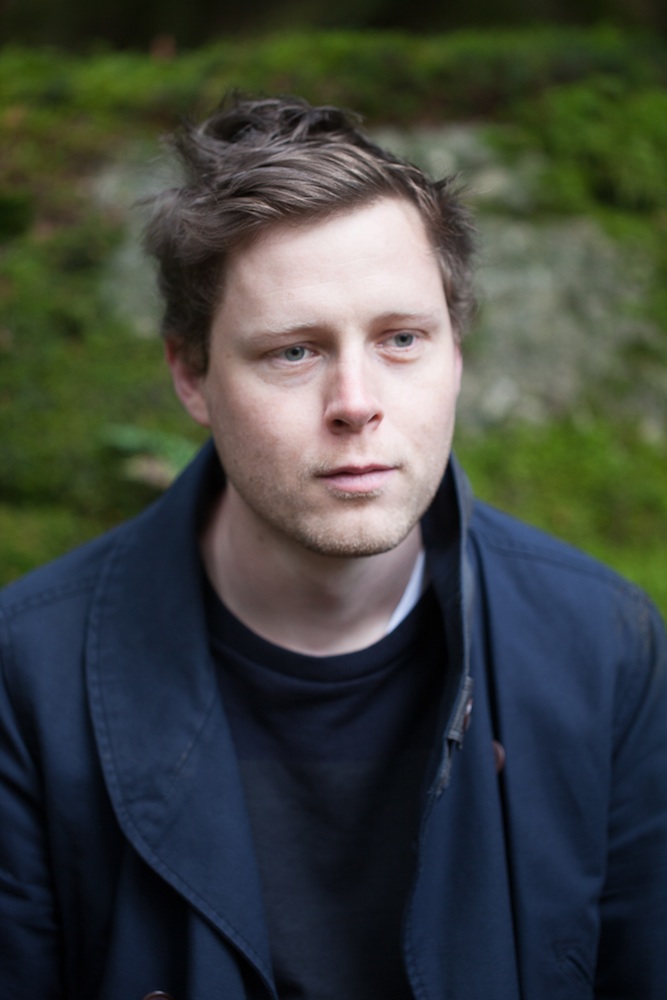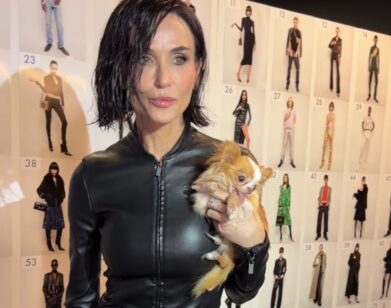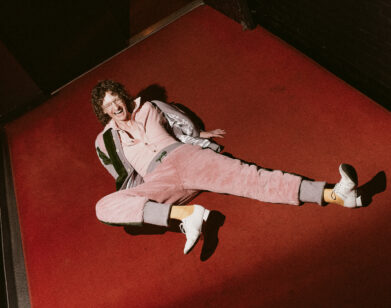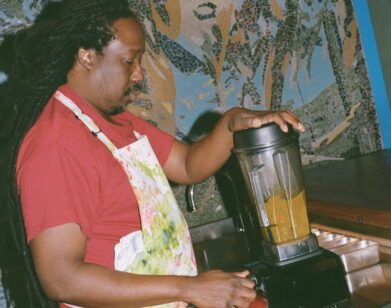Max Porter’s Mis-Remembrance of Things Past

ABOVE: MAX PORTER. PHOTO COURTESY OF LUCY DICKENS
English editor and writer Max Porter’s debut novel Grief Is the Thing with Feathers (Graywolf Press) dramatizes one family’s experience of loss, mourning, and love. It is inventive, darkly funny, and tender. “We will never fight again, our lovely, quick, template-/ready arguments. Our delicate cross stitch of bickers.” As heartbreaking as it is full of hope, Porter’s book has received a deservedly positive first response. Published last year in England and out today in the U.S., it was shortlisted for both the Guardian First book award and the Goldsmiths Prize and, recently, won the Dylan Thomas Prize.
The character “Dad” is numb with grief after his wife’s sudden and accidental death. A scruffy romantic and, like Porter, a Ted Hughes scholar, he sits waiting “for any kind of structured feeling to emerge from the organizational fakery” of his days. “Boys,” a pair portrayed as one character, confront their mother’s abrupt absence through memory and play, reconstructing stories, drawing pictures, and assembling representations of the parent they no longer have. A blend of poetry, essay, and a play-in-voices, Grief Is the Thing with Feathers dissolves formal boundaries in order to reflect the psychology of experimentation and progress, of collapsed distinctions between things imagined and real.
At the heart of the story is “Crow,” a character from Ted Hughes and called into existence by Dad to thaw his grief. The crow of Hughes’ eponymous work, which was written in the years following Sylvia Plath’s death, is born of God’s post-creation nightmare; it searches on earth for his own creator, an in-between agent of both chaos and love. The crow of Porter’s work is an homage to Hughes and an embodiment of the spirit of homage itself: “I was friend, excuse, deus ex machina, joke, symptom, figment, specter, crutch, toy, phantom, gag, analyst and babysitter.”
We recently spoke to Porter about Ted Hughes, tradition, and what sparked his own writing life.
ALICE WHITWHAM: Crow introduces himself into the novel and into Dad’s mind like an intruder—sudden and wilful. “There was a crack and a whoosh and I was smacked-back, winded, onto the doorstep.” Does Crow’s entrance into the work reflect the way the project began for you?
MAX PORTER: Yes, in a way it does. I was thinking for a long time about how to tell this story, about the sibling relationship as a character, about crows, and Crow, and shock, and the architecture of a family unit being suddenly broken and how best to deal with that stylistically. Then I had a drink with an old friend of my dad’s, and hearing some of his stories, thinking about how we talk to children about death, flicked a switch. I more or less ran home and started writing the book that night. I felt suddenly completely certain of the triptych, the shape of the thing, and the function of the crow.
WHITWHAM: Do you have a favorite poem, or sequence, in Hughes’ Crow?
PORTER: I have complex feelings about Crow. It’s such an ugly and radical and complex book, and I’m now unable to separate it from the letters and books I’ve read about it. But if forced to choose, I’d choose “Lovesong.” My girlfriend—now my wife—gave it to me and I remember being physically shocked by it, amazed, relieved that there was work like this in the world. I also remember thinking I would fall in love with a girl who gave me a dangerous poem like that to read.
WHITWHAM: What else were you reading around the time you were writing?
PORTER: I read a lot for work, hundreds of books a year, too fast, and it’s not an especially healthy thing. So for pleasure—for purge—I read a lot of poetry. I always have a dozen or so books of poetry on the go. I read children’s books to my kids, and I read myths and fables to cleanse my palette. The Russian fairytales were especially influential for this book, for their directness, their speed and wit and darkness. I had put away all the books about crows, and I stopped reading Hughes because it would have been disastrous to have his voice in my crow. If in need of revelatory re-charging I would always read David Jones, Basil Bunting, Anne Carson, or Alice Oswald. I got very into Jorie Graham around about the time I was finishing the book. When in doubt, for a reminder of how vast the possibilities are, and how humble we should be, Emily Dickinson.
WHITWHAM: In the Dickinson poem, which is the epigraph to the book, Crow has scratched out certain words and written over them with his name, “Crow.” Why was it important to you to let that engagement with other writers, with tradition, show?
PORTER: I like that you think it’s Crow. I agree he is the likeliest candidate because of his playful ego-mania. But it could have been Dad or the Boys too. Absolutely yes, it’s my way of saying that the poem—any poem—is the reader’s to use, to play with, to interrogate. To drag sideways into the mess of life, rather than preserve in a vertical axis of influence. It’s vandalism, but wholly in the spirit of homage. A keeping alive, a questioning, a grateful turning of the original in the mind to see how else it might speak, in what other ways it might function.
Also, it is fundamental to my Crow that he is playing with the role of literary character. So Hughes is just one manifestation—towards which he has a slightly sarcastic disrespect borne of 30 years hindsight—rolling around his performance palette with many other symbolic or literary or ornithological playsuits. He represents the poetry freed from the poet, unleashed to mock the sanctity of the creator. Especially when that creator is a man, a man so horribly bogged down by his biographical trauma. It’s ultimately suggesting that the poet shouldn’t get in the way of the poems, but that it is total madness to deny the two being hideously intertwined, offering countless ways in and around.
WHITWHAM: This is very much a novel about archetypes, Crow being the central one. Do you think it is less of a novel if the reader hasn’t read the Hughes, and doesn’t know about the tradition behind it?
PORTER: I’ve been thrilled when Hughes experts have written to me saying they’ve found little hidden things, jokes, nods, which add or speak to Hughes scholarship, but that is a secondary thing. It shouldn’t distract from the Boys and Dad and the drama of their lived experience. With wider Crow mythology and symbolism, I think any work is writing into a massive backlog of archetypes, and different readers bring different depths of understanding. Indian readers have told me I seem to be tackling head on Indian fables of Crow visitation. French readers couldn’t believe I wasn’t ribbing Poe. And so on, as wide as the sea of readers.
WHITWHAM: Do you feel as though writing the book has changed your relationship to Hughes?
PORTER: It’s given me some clarity on the challenges of separating a person from their work. It’s given me some space from Crow. It’s allowed me to realize which Hughes I love most, which is the Hughes of the letters, his writing on ecology, Shakespeare, landscape, and myth. There are collections by Hughes—River, Remains of Elmet—that strike me as some of the most exquisite poetry ever written in English. I don’t regret taking on such a baggage-laden cameo, but I’m unlikely to ever do it again. It opens the work to a set of misunderstandings way beyond the work’s intention. I’d rather invent my own next time.
WHITWHAM: In grieving we turn to memories but they’re often unreliable. It’s a lovely, painful moment when the Boys recall having once resisted Mum’s instruction to take a bath before bed. In one memory, Mum reads them a story anyway; in another, she doesn’t. Can you say a bit about this idea of memory’s instability?
PORTER: I think what I’m hoping to get at is that mis-remembrance is as vital, or generative, as remembrance, especially when it is a component of a busy living relationship between two people, in this case the Boys. They are engaged in a loving game, sometimes deliberate, sometimes unconscious, where they are playing with the narrative threads of their childhood. This play is everything. It’s what allows them to keep thinking carefully about their mother. And they’ve figured this out from Crow’s use of archetypes, something they borrow. They use these flat outlines of myth or fable, and color in the pictures themselves. It’s the coloring in, the nudging, checking, flipping of the template, that gives their stories meaning. It allows them to keep thinking about their mum, keep caring for their dad. They are pro-choice portrayers of themselves as players in a drama. That drama needs to be huge and dramatic at times, but they know—and we know—it’s also the small domestic drama of life. Every story.
WHITWHAM: Writing about grief can often lead to sentimentality. How did you use sentimentality in your work?
PORTER: I allowed myself to go so far, and then had Crow check it. It’s important to be sentimental. I would be terrified of a society in which sentimentality has no place, because it would mean a loss of empathy, a loss of tenderness, an inability to connect the past to the present. I’d hate to see us all “toughen up,” machine-like, in the face of great pain. But like nostalgia, it needs to be checked. It cannot be an instrument of denial. I think of sentimentality like a luxury good. I allow myself deep gulps of it now and then. The most important line in the book, in this respect, is when Crow says to Dad “Eugh, you sound like a fridge magnet.” He is warning him that the sickly sweet employment of richly sentimental poetic tropes will only get him so far, will only be a thin kind of nourishment in the long run.
WHITWHAM: Mum isn’t a character in the book, but she manifests very physically. Objects associated with her are everywhere: “She won’t ever use (make-up, turmeric, hairbrush, thesaurus)/She will never finish (Patricia Highsmith novel, peanut-butter, lip-balm).” Why are objects, however mundane, such strong repositories of grief?
PORTER: I think because we all occupy universes of things. We move around the world in relation to objects. In the once-owned object is all the vast importance of a life, as well as the utter meaninglessness of it. We are fetishistic people, and I was keen to flood the house with relics so that a kind of object drama could be enacted between the busy living world of children living—ketchup, football stickers—and the heartbreaking prop cabinet of the no-longer owned. The relic is a terrible pain refresher, but also has a meditative function.
WHITWHAM: Were there parts of your own life you wanted to keep out of the writing?
PORTER: Yes. I only included one or two actual truths, in an attempt to be writing at a certain distance. I believe in going to the hottest place—imagining, even for a terrible split second, what it might be like to lose my wife—but also not necessarily needing biographical resemblance to do so. I also saw Dad as an opportunity to create someone quite different from me, maybe as an act of peculiar masochistic voyeurism. To see a bloke a bit like me destroyed, with a safety net of his not being me. Perhaps this distance, figuring out how to make something true from invented things, is why I could only have written this book now, with kids, aware of the terrifying anxiety and limitless joy of caring for little people.
WHITWHAM: “What good is a crow to a pack of grieving humans? A huddle. A throb. A sore. A plug. A gape. A load. A gap.” Crow’s monologues are made up of playful enigmatic fragments. How did it feel to write them?
PORTER: Fun. I wanted the book to be bird-like, to hop and soar and surprise as actual crows do. And landing on his sections felt like a blast of strong unpredictable wind, or, as the case may be, a disgusting sticky mess to of linguistic garbage to dive in.
WHITWHAM: The length and form of the book suggest it was written without publishing industry standards of “salability” in mind. When did you decide to publish it?
PORTER: Long after it was finished and I had shown it to a pal who said she thought it highly unlikely that anyone would make a book of it. But then I couldn’t quite let go, couldn’t accept that it wasn’t something which, if set and produced beautifully, would be an interesting thing for readers.
WHITWHAM: The response has been great; readers seem excited by innovation. Who are you reading at the moment?
PORTER: I just finished a simply gorgeous book by Dorthe Nors called So Much for That Winter. I’ve been reading a brilliant smack-down of the singularly appalling and loathsome politician Boris Johnson called The Beast of Brexit: A Study of Depravity by Heathcote Williams. I’ve been reading the poems of Sam Buchan—Watts and Peter Riley. I’ve been reading Eric Carle’s From Head to Toe, and our baby does the most hilarious Bison impression. His bison is like a shocked shrugging Paul Giamatti.
GRIEF IS THE THING WITH FEATHERS COMES OUT TOMORROW, JUNE 7 ,2016.






